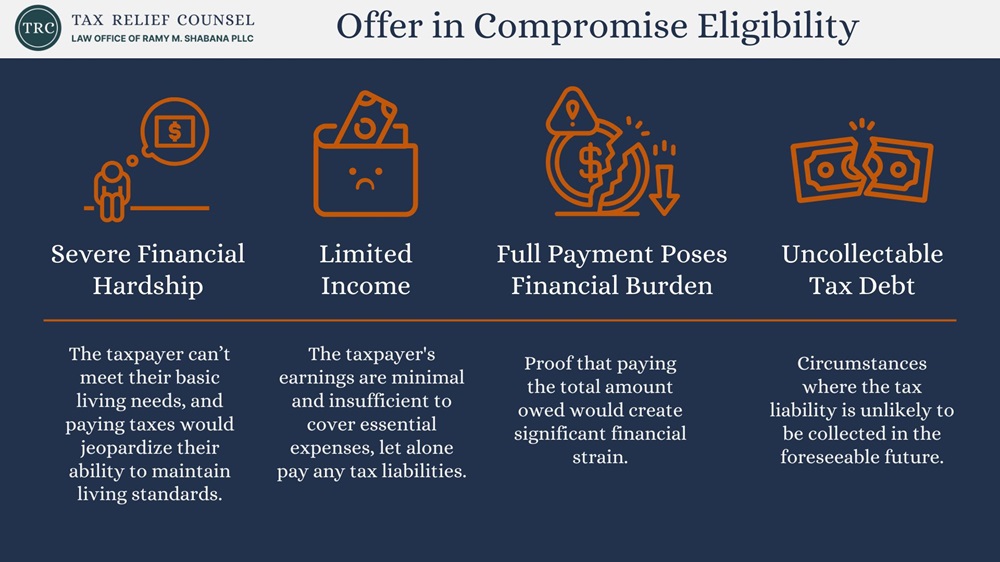Table of Contents
When Maryland taxpayers find themselves burdened with outstanding tax liabilities, they need to know where to turn. Maryland’s state tax forgiveness programs are designed to provide relief to qualified individuals who face financial hardship.
Tax Relief Counsel covers everything you need to know about how these programs work, their eligibility requirements, and the steps involved in applying.
What Is the Maryland Offer in Compromise Program?
The Maryland offer in compromise (OIC) program is the primary avenue for those seeking tax forgiveness. Through this program, the Comptroller of Maryland allows taxpayers to settle their tax liability for less than the full amount owed.
This program may be available if paying in full would create significant financial hardship or if the taxpayer will be unable to pay the taxes in full for the foreseeable future.
Who Qualifies for the Offer in Compromise Program?

Not everyone with tax debt qualifies for Maryland’s OIC program. To be eligible, a taxpayer must show that they have insufficient resources to pay the debt in full. The Comptroller of Maryland typically looks for the following:
- Evidence of severe financial hardship.
- Limited income and minimal assets.
- Proof that paying the total amount owed would create significant financial strain.
- Reasons that the taxpayer will likely be unable to pay the tax in the future.
The comptroller’s office will review the taxpayer’s current income, assets, and overall financial situation to determine eligibility.
Types of Tax Liabilities Covered
Not all tax debts may qualify. The OIC program applies to the following:
- Income taxes: Levied on earnings for an individual taxpayer or a business.
- Admissions and amusement taxes: Imposed on income from entertainment activities, such as ticket sales for events or shows.
- Sales and use taxes: Collected by a business to be passed on to the government.
- Tax penalties: Charges for noncompliance or violations, such as late payments or underreported income.
People who are responsible for business taxes can file for an OIC only if the business has closed.
How to Apply for the Maryland Offer in Compromise Program

Applying for Maryland’s OIC program involves some preparation:
- Gather required forms and documentation: You will need detailed financial statements and information about your business, if applicable.
- Collect a down payment: Try to collect a portion of what you owe so that you can make an offer in good faith.
- Complete the relevant forms: These include Form MD 656 and Form MD 433-A.
Finally, you can send your completed application, along with any supporting documents, to the comptroller’s office. You can send your application by mail, but it will be processed more quickly if you send it electronically.
Understanding the Offer Amount
In your application for OIC, you will make an offer based on what you can reasonably pay. When making this offer, you should consider the following:
- Assets: The value of your property, vehicles, and other assets.
- Income: Your current earnings and projected future income.
- Expenses: Your living costs and other allowable expenses.
You can make a deposit, pay the offer in full, or ask for a payment plan on Form MD 656.
Possible Outcomes of an Offer in Compromise
There are a few potential outcomes when you apply for an OIC:
- Acceptance: The comptroller’s office agrees to your offer, and you make the payment.
- Counteroffer: The comptroller’s office suggests a different amount that it finds acceptable.
- Rejection: The offer in compromise is not accepted.
If your application is rejected, you are allowed to refile, especially if your circumstances change.
Worried About Delinquent Taxes?
Let Tax Relief Counsel guide you through filing an offer in compromise. Contact us today.
Call Me Personally
What If Your Offer Is Rejected?
If your OIC application is denied, don’t lose hope. A rejection is not final, and you are allowed to refile.
Your second application is more likely to succeed if your circumstances have changed in the meantime. Additionally, your original application might have been rejected because you didn’t include enough information in your application. If that’s the case, Tax Relief Counsel can help you prepare an OIC application that reflects your true situation.
Alternative Solutions to Tax Forgiveness
Apart from the OIC program, there are other ways to manage tax debt:
- Installment agreements: These allow taxpayers to make smaller, more manageable payments over time.
- Currently Not Collectible status: If you have no means to pay federal taxes, you might qualify for this status, which halts collection activities temporarily.
- Penalty abatement: Taxpayers facing civil penalties may seek relief if they can show reasonable cause.
When your tax liability is too high to pay, speak to a tax attorney about pursuing forgiveness through one of these programs.
Benefits of Seeking Legal Help

A tax attorney can ensure that your application is accurate and includes documents and information that demonstrate clearly that you are unable to pay your full tax liability. They can also provide strategic advice on whether an OIC or another program is the right path for you.
Tips for a Successful Offer in Compromise
- Be thorough: Provide complete financial documentation.
- Seek legal assistance: Consult with a tax lawyer for detailed guidance.
- Stay organized: Keep track of your forms, expenses, and assets.
Get a Trusted Tax Attorney for Your Delinquent Tax Liability
Maryland’s offer in compromise program is helpful for qualified individuals who are facing financial hardship. Whether you choose to apply independently or with the assistance of a tax lawyer, staying informed is the best way to prepare.
If you’re struggling with back taxes or an outstanding tax liability, we can help. Contact Tax Relief Counsel for a free and confidential consultation.


